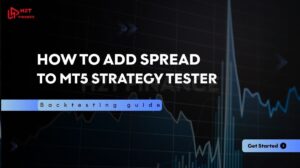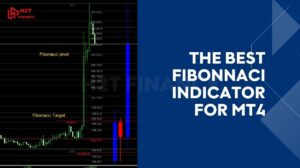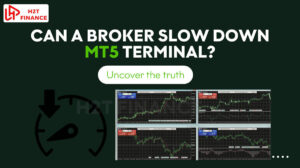Figuring out how to find a broker for forex that aligns with your needs is one of the most pivotal decisions you'll make, directly shaping your trading journey. A reputable broker doesn't just safeguard your invested capital; they provide the optimal tools and trading conditions essential for navigating the foreign exchange market. However, with countless options available, how do you make an informed choice? Join H2T Finance as we break down the process of selecting a forex broker systematically and effectively in this comprehensive guide.
1. What is a forex broker?
A Forex broker is an intermediary financial services company that provides traders with access to a platform for buying and selling foreign currencies. Essentially, individual retail traders cannot just walk into the interbank market (the global network where large banks and financial institutions trade currencies with each other). Instead, they need a broker to execute their trades. The broker acts as a gateway, connecting you to the Forex market.
There are generally a few types of Forex brokers, differentiated by how they process trade orders:
- Dealing Desk (DD) brokers / Market Makers: These brokers create a market for their clients, meaning they often take the other side of a client's trade. They set their own bid and ask prices, which are usually derived from, but not identical to, interbank rates. They make money primarily through the spread and by managing their overall book of client positions.
- No Dealing Desk (NDD) brokers: These brokers pass their clients' orders directly to liquidity providers (which can be banks, other brokers, or financial institutions) in the interbank market. NDD brokers can be further categorized:
- Straight Through Processing (STP): Orders are routed directly to liquidity providers, and the broker typically adds a small markup to the spread.
- Electronic Communication Network (ECN): ECN brokers provide direct access to an electronic network where buy and sell orders from various market participants (banks, other traders, institutions) are matched. They usually charge a commission per trade instead of (or in addition to) widening the spread.
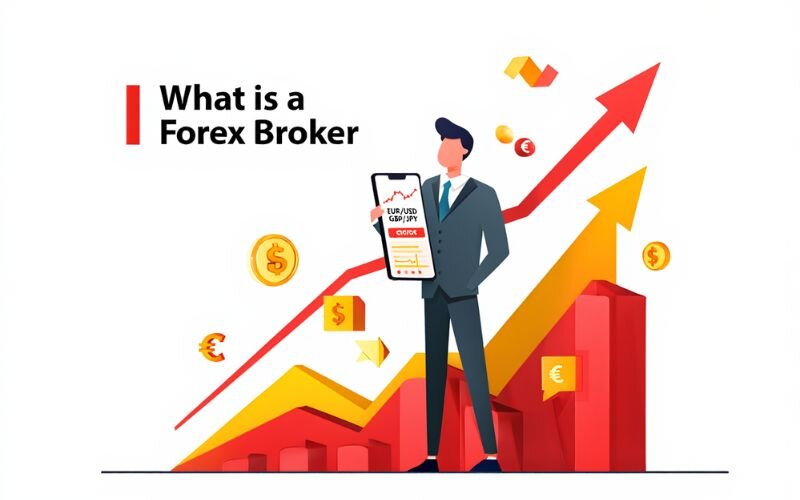
Regardless of their model, Forex brokers primarily earn revenue in a few ways:
- Through the spread: This is the difference between the bid (sell) price and the ask (buy) price of a currency pair. Brokers often add a markup to the spreads they receive from their liquidity providers.
- Through commissions: Some brokers, particularly ECN brokers, charge a fixed commission per trade.
- Overnight financing fees (swaps/rollover): Fees charged or paid for holding positions open overnight.
Understanding what a Forex broker is and the different types available is the first step before you consider how to find a broker for forex that suits your trading needs.
2. Why choosing the right forex broker is crucial for your trading success
Before diving into the "how-to", it's vital to understand why the meticulous process of selecting a forex broker is so fundamental to your potential success in the currency markets. Many traders, especially those new to forex, underestimate this step, but your choice of broker extends far beyond just a platform to place trades; they are, in essence, your primary partner in the trading environment.
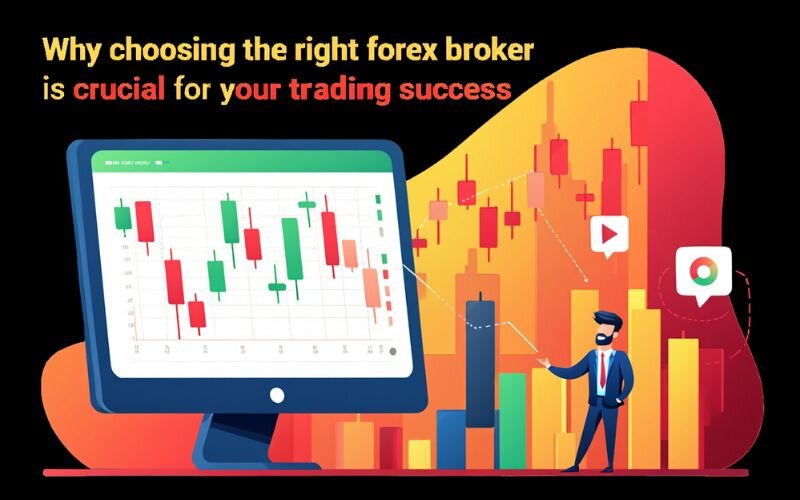
Here’s a breakdown of why this decision carries so much weight:
- Security of your funds: This is paramount. The wrong broker, particularly one that is unregulated or poorly regulated, can put your entire investment at risk. A trustworthy broker ensures your funds are held securely, often in segregated accounts, and operates under strict financial standards. The peace of mind that comes with knowing your capital is safe allows you to focus on trading.
- Impact on trading costs: Every trade incurs costs, typically in the form of spreads (the difference between the bid and ask price), commissions, and swap fees (for holding positions overnight). These costs, while seemingly small per trade, can significantly accumulate and erode your profits over time. A competitive broker offers transparent and reasonable fee structures that don't unduly eat into your potential returns.
- The trading experience: A broker's platform stability, order execution speed, and the quality of their customer support directly influence your trading experience. Frequent platform crashes, slow execution leading to slippage (getting a different price than expected), or unresponsive support can be incredibly frustrating and detrimental to your trading performance.
- Ability to execute your strategies: Different trading strategies require different tools and order types. Whether you're a scalper needing rapid execution and tight spreads or a long-term trader relying on in-depth analytical tools, your broker must provide the necessary features. This includes a range of order types (market, limit, stop), robust charting packages, and access to reliable market data.
- Regulatory environment and fairness: A well-regulated broker is more likely to offer fair trading conditions, transparent pricing, and ethical practices. Regulatory oversight provides a layer of protection and recourse for traders.
Ultimately, understanding how to find a broker for forex trading carefully means setting a strong foundation for your trading endeavors. It's not just about accessing the market; it's about accessing it through a partner who facilitates, rather than hinders, your journey.
3. Understanding key forex broker terminology before you start
Navigating the world of forex brokers can feel like learning a new language. Before you can confidently compare your options and understand their offerings, it’s essential to grasp some fundamental terms. This foundational knowledge will prevent confusion and empower you to ask the right questions.
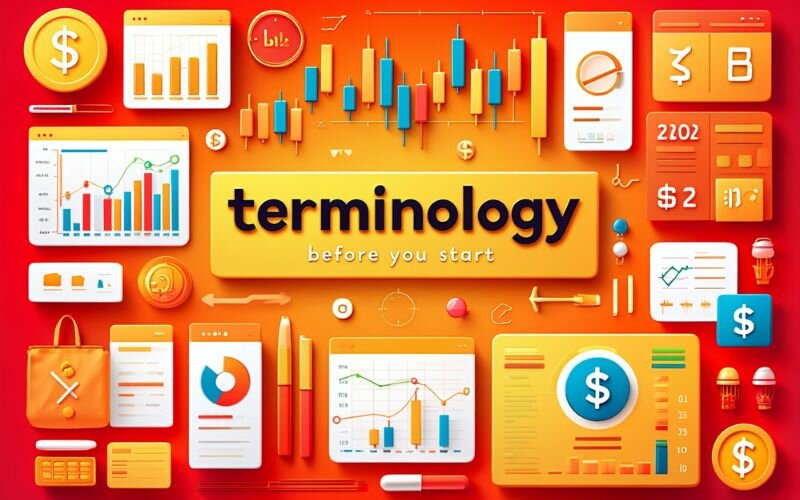
Here are some of the core concepts you'll encounter:
- Spread: This is the difference between the 'bid' (sell) price and the 'ask' (buy) price of a currency pair. It's one of the primary ways brokers, especially 'market maker' brokers, earn money. A tighter (smaller) spread is generally more favorable for traders as it means a lower implicit cost to enter a trade. Spreads can be fixed or variable (floating).
- Commission: Some brokers, particularly ECN (Electronic Communication Network) or STP (Straight Through Processing) types, charge a commission per trade instead of, or in addition to, the spread. This is typically a set fee per lot traded.
- Leverage & Margin: These two terms are interlinked and crucial to understand in forex trading.
- Leverage allows you to control a large trading position with a relatively small amount of your own capital. For example, with 1:50 leverage, for every $1 you put up (margin), you can control $50 in the market. While leverage can amplify potential profits, it's a double-edged sword and equally amplifies potential losses. US regulations, for instance, cap leverage for retail forex traders (e.g., typically 50:1 for major pairs).
- Margin is the actual amount of your own money required to open and maintain a leveraged trading position. It's not a fee, but rather a portion of your account balance set aside as a good-faith deposit. If your trades move against you and your account equity falls below the required margin level, you may receive a 'margin call,' forcing you to deposit more funds or close positions to prevent further losses.
- Pip (Percentage in Point): A pip is the smallest unit of price movement in an exchange rate. For most currency pairs quoted to four decimal places (e.g., EUR/USD at 1.0755), one pip is 0.0001. For Japanese Yen pairs (e.g., USD/JPY at 150.25), one pip is typically 0.01. Understanding pips helps you calculate potential profits and losses.
- Lot: A lot refers to the size of your forex trade. The standard lot size is 100,000 units of the base currency. However, most brokers also offer:
- Mini lot: 10,000 units
- Micro lot: 1,000 units
- Some even offer Nano lots: 100 units.
Choosing the appropriate lot size is critical for risk management, especially for beginners.
- Order Types: These are instructions you give your broker to execute trades. The most common include:
- Market Order: An order to buy or sell immediately at the best available current market price.
- Limit Order: An order to buy or sell at a specific price or better. A buy limit order is placed below the current market price, and a sell limit order is placed above the current market price.
- Stop Order (often a Stop-Loss Order): An order that becomes a market order once a specific price (the stop price) is reached. A stop-loss order is used to limit potential losses on an open position by automatically closing it if the price moves against you to a predetermined level. A buy stop is placed above the current market price (e.g., to enter a trade on a breakout), and a sell stop is placed below the current market price.
Familiarizing yourself with these terms is the first step towards making an educated decision when you start to research how to find a good broker for forex.
See more related articles:
- 10+ Legal Forex trading app in India: Guide to safe and compliant trading
- What is a stop limit order? How does it work, and when to use it?
- Does Blusky allow scalping? Explore the trading methods available at Blusky for investors
4. How to find a broker for forex: A comprehensive step-by-step guide
Now that you're equipped with key terminology, we arrive at the core of our discussion: the actual process of finding a forex broker that suits your specific requirements. This isn't a decision to be rushed. By following a structured approach, you can systematically narrow down the vast field of options and select a partner that aligns with your trading ambitions.
Here’s a quick overview of the steps we'll cover in detail:
- Step 1: Define your trading needs and goals.
- Step 2: Research potential forex brokers – where to look.
- Step 3: Verify regulatory compliance – the most critical check.
- Step 4: Evaluate trading costs and conditions.
- Step 5: Assess trading platforms and tools.
- Step 6: Examine deposit and withdrawal options.
- Step 7: Test customer support quality.
- Step 8: Consider account types and educational resources.
- Step 9: Check broker reputation and reviews (objectively).
Let's begin with the foundational first step.
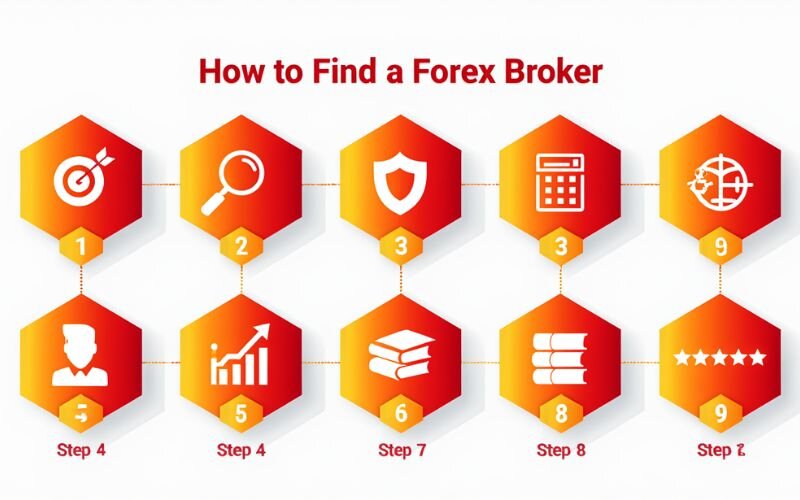
Step 1: Define your trading needs and goals
First, understand yourself as a trader. This self-assessment will filter your search significantly. Key questions:
-
Experience Level: Beginner (needing guidance, simple platform, micro lots) or experienced (seeking advanced tools, ECN)?
-
Trading Style: Scalping (many small, quick trades), day trading (trades within a day), swing trading (days/weeks), or long-term (weeks/months+)? Each style has different broker requirements (e.g., low spreads for scalping, reasonable swaps for swing).
-
Primary Currency Pairs: Major, minor, or exotics? Ensure the broker offers what you need.
-
Initial Capital & Risk Tolerance: How much can you invest and comfortably risk? This impacts account choice and leverage. US leverage is capped (e.g., 50:1 majors).
-
Need for a Demo Account: Essential for beginners to practice risk-free and test platforms.
Answering these helps define your ideal broker profile.
Step 2: Research potential forex brokers – where to look
With your needs defined, start your search using credible sources:
-
Financial Regulatory Body Websites:
-
For US traders: National Futures Association (NFA) and Commodity Futures Trading Commission (CFTC) are primary. Search their member directories (e.g., NFA's BASIC system).
-
-
Independent Broker Review Websites: Look for objective, data-driven comparisons and clear review methodologies.
-
Trader Forums/Communities (e.g., Forex Factory, Reddit): Useful for insights, but be cautious and always cross-verify information. Don't rely solely on forum comments.
-
Broker Websites: For direct information on services and conditions.
Avoid: Over-hyped ads promising unrealistic profits, unsolicited offers, and high-pressure sales tactics.
Your goal: A preliminary list of 5-10 potential brokers.
Step 3: Verify regulatory compliance – the most critical check
This is non-negotiable. Regulation is your primary protection.
-
Why it matters: Ensures fund safety (segregated accounts), fair practices, dispute resolution, and broker capital adequacy.
-
For US Traders: Prioritize brokers registered with the CFTC and NFA Members.
-
How to Verify (US focus):
-
Get the broker's NFA ID from their website.
-
Go to the NFA's BASIC Search system (www.nfa.futures.org/basicnet/).
-
Enter the NFA ID/firm name.
-
Confirm "NFA Member" status and CFTC approval as a Retail Foreign Exchange Dealer (RFED). Check for matching company details and any disciplinary history.
-
-
Crucial Note: If a broker isn't verifiably regulated by the NFA/CFTC for US clients, avoid them. "Regulated" in a lax offshore jurisdiction offers little protection for US residents.
Step 4: Evaluate trading costs and conditions
Costs directly impact profitability. Compare:
-
Spreads: Fixed or variable? What are the average spreads on your preferred pairs (not just "as low as" claims)?
-
Commissions: Charged on which accounts (common for ECN/STP)? How are they calculated?
-
Swap Fees (Rollover): Relevant for overnight positions. Check rates for your pairs.
-
Other Fees: Deposit/withdrawal charges, inactivity fees.
-
Leverage & Margin: Understand offerings and ensure compliance with US leverage caps (e.g., 50:1 majors).
-
Execution Quality: Speed and slippage (difference between expected and filled price). Demo accounts offer a glimpse; live reviews provide more insight.
Brokers should transparently list these on their site.
Step 5: Assess trading platforms and tools
Your platform is your trading hub. It must be reliable and user-friendly.
-
Popular Platforms:
-
MetaTrader 4 (MT4): Widely used, great for forex, many custom tools/EAs. Excellent for beginners.
-
MetaTrader 5 (MT5): Newer, more features, multi-asset capabilities.
-
cTrader: Known for DOM, fast execution, often favored by experienced traders.
-
Proprietary Platforms: Broker-specific. Test thoroughly via demo.
-
-
Key Features: Good charting, intuitive UI, stability, necessary order types, mobile/web access.
-
Additional Tools: Economic calendar, news feeds. Approach trading signals with caution.
Action: Thoroughly test platforms using a demo account.
Step 6: Examine deposit and withdrawal options
Smooth fund movements are crucial.
-
Methods: Bank wire, credit/debit cards. E-wallet (PayPal, Skrill) availability for US forex clients can be limited by regulation verification.
-
Processing Times: For both deposits and, importantly, withdrawals.
-
Fees: For deposits (less common) and withdrawals (more common).
-
Limits: Minimum/maximum for transactions.
-
KYC Process: All regulated brokers require identity/address verification before withdrawals. Complete this early to avoid delays.
-
Red Flags: Vague fee info, long withdrawal delays reported by users.
Action: Consider a small test deposit/withdrawal after KYC.
Step 7: Test customer support quality
Good support is invaluable when issues arise.
-
Channels & Availability: Live chat, email, phone? Are they available 24/5 (market hours)?
-
Test Responsiveness:
-
Prepare a few relevant questions (e.g., about spreads, margin).
-
Contact via different channels.
-
Evaluate response speed, clarity, and professionalism.
Poor pre-sales support often means poor ongoing support.
-
Step 8: Consider account types and educational resources
These enhance your experience, especially for new traders.
-
Account Types:
-
Look for Micro/Mini accounts (smaller trade sizes) if a beginner.
-
Demo accounts are vital for practice.
-
Check minimum deposits and features per account.
-
-
Educational Resources:
-
Articles, videos, webinars. Focus on quality and relevance over quantity.
While not primary factors, good options here show broker commitment.
-
Step 9: Check broker reputation and reviews (objectively)
Gauge overall sentiment, but be critical.
-
Sources: Independent review sites (not just broker testimonials), trader forums.
-
What to Look For:
-
Broker's time in market (longer can indicate stability).
-
Patterns in user feedback (consistent complaints or praises).
-
Verify the credibility of any "awards."
-
-
Caution: Be wary of overly emotional or vague reviews. Dissatisfied customers are often louder.
-
Action: Triangulate information from multiple sources. Widespread, credible negative feedback on critical issues (fund safety, withdrawals) is a major red flag.
Following these steps will help you choose a forex broker confidently and securely.
4. Forex broker checklist: key criteria at a glance
To help you consolidate your research and make a final decision, use this checklist to quickly evaluate and compare your shortlisted forex brokers. Print this out or save it digitally to track your findings.
BROKER EVALUATION CHECKLIST
| Feature Area | Criteria | Broker 1 | Broker 2 | Broker 3 |
|---|---|---|---|---|
| Regulatory Compliance (US Focus) | NFA Member & CFTC Registered? (Verified via NFA BASIC) | ☐ | ☐ | ☐ |
| Regulator Name & License Clearly Stated? | ☐ | ☐ | ☐ | |
| Client Fund Segregation Confirmed? | ☐ | ☐ | ☐ | |
| Trading Costs & Fees | Average Spreads (Main Pairs) Competitive? | ☐ | ☐ | ☐ |
| Commissions (if any) Clearly Defined? | ☐ | ☐ | ☐ | |
| Swap/Rollover Fees Reasonable? | ☐ | ☐ | ☐ | |
| Deposit/Withdrawal Fees Transparent & Acceptable? | ☐ | ☐ | ☐ | |
| Inactivity Fees Aware? | ☐ | ☐ | ☐ | |
| Trading Platform & Tools | Platform(s) Suit Needs? (MT4/MT5/cTrader/Proprietary) | ☐ | ☐ | ☐ |
| Stable & User-Friendly? (Demo Tested) | ☐ | ☐ | ☐ | |
| Essential Charting Tools & Indicators? | ☐ | ☐ | ☐ | |
| Robust Mobile & Web Trading? | ☐ | ☐ | ☐ | |
| Account Options & Conditions | Suitable Account Types? (Standard, Micro/Mini, ECN) | ☐ | ☐ | ☐ |
| Minimum Deposit Achievable? | ☐ | ☐ | ☐ | |
| Leverage Complies with US Regulations? (e.g., up to 50:1 majors) | ☐ | ☐ | ☐ | |
| Deposits & Withdrawals | Convenient Methods (esp. for US clients)? | ☐ | ☐ | ☐ |
| Reasonable Processing Times (Deposits & Withdrawals)? | ☐ | ☐ | ☐ | |
| KYC Process Understood? | ☐ | ☐ | ☐ | |
| Customer Support | Availability (e.g., 24/5)? | ☐ | ☐ | ☐ |
| Accessible Channels (Live Chat, Phone, Email)? | ☐ | ☐ | ☐ | |
| Responsive & Quality Support (Tested)? | ☐ | ☐ | ☐ | |
| Broker Reputation & Transparency | Established? (Years in Operation) | ☐ | ☐ | ☐ |
| User Reviews Mostly Positive/Neutral on Key Issues? (Objective Check) | ☐ | ☐ | ☐ | |
| Website Information Clear & Accessible? | ☐ | ☐ | ☐ |
This checklist covers the fundamental areas you must investigate. Aim for a broker that allows you to confidently tick most of these boxes, especially the critical ones related to regulation and fund safety.
-
Regulatory Compliance (Crucial for US Traders):
-
NFA Member & CFTC Registered? (Verify NFA ID on BASIC system)
-
Regulator Name & License Number (Clearly stated and verifiable?)
-
Client fund segregation confirmed?
-
-
Trading Costs & Fees:
-
Average Spreads on your main pairs (e.g., EUR/USD, GBP/USD): Competitive?
-
Commissions (if applicable, esp. for ECN accounts): Clearly defined?
-
Swap/Rollover Fees: Reasonable for your trading style?
-
Deposit/Withdrawal Fees: Transparent and acceptable?
-
Inactivity Fees: Aware of any?
-
-
Trading Platform & Tools:
-
Platform(s) Offered (MT4, MT5, cTrader, Proprietary): Suits your needs?
-
Stability & User-Friendliness (Tested via Demo Account?): Satisfactory?
-
Essential Charting Tools & Indicators: Available?
-
Mobile & Web Trading Options: Robust and functional?
-
-
Account Options & Conditions:
-
Account Types (Standard, Micro/Mini, ECN): Suitable for your experience & capital?
-
Minimum Deposit: Achievable for you?
-
Leverage Offered: Complies with US regulations (e.g., up to 50:1 majors)?
-
Order Execution Quality (based on reviews/demo): Fast and reliable?
-
-
Deposits & Withdrawals:
-
Methods Available (esp. for US clients): Convenient?
-
Processing Times (Deposits & Withdrawals): Clearly stated and reasonable?
-
KYC Process: Understood and documents ready?
-
-
Customer Support:
-
Availability (24/5 ideal?): Matches your needs?
-
Channels (Live Chat, Phone, Email): Accessible?
-
Responsiveness & Quality (Tested?): Helpful and knowledgeable?
-
-
Broker Reputation & Transparency:
-
Years in Operation: Established?
-
User Reviews (multiple sources, objective assessment): Mostly positive or neutral regarding key aspects (funds, withdrawals)?
-
Clear Information on Website: Easy to find terms and conditions?
-
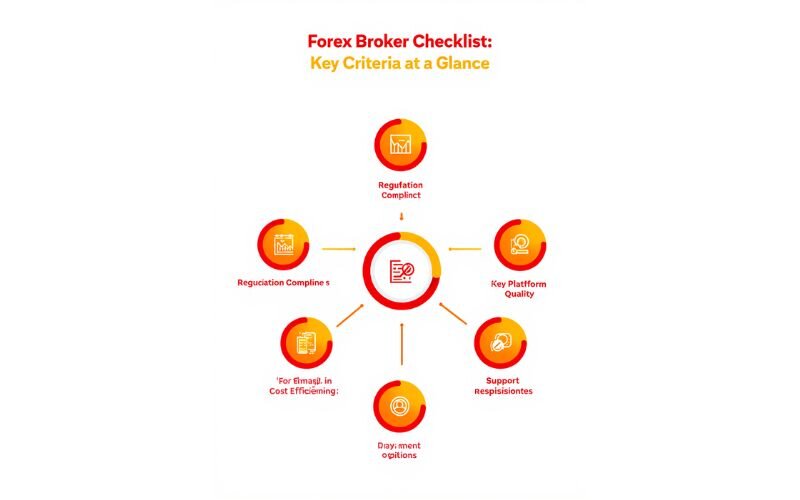
This checklist isn't exhaustive for every niche need, but it covers the fundamental areas you must investigate. Ticking off these boxes with positive answers for a specific broker will significantly increase your chances of partnering with a reliable and suitable firm.
5. How to choose the best forex broker
Figuring out how to find a broker for forex that aligns with your trading needs and ensures the safety of your funds is one of the most critical decisions you'll make as a trader. The "best" forex broker is subjective and depends on individual priorities, but there are several key criteria every trader should evaluate. A diligent selection process can save you from potential headaches and financial loss down the line.
Here’s a comprehensive guide to help you navigate the process:
5.1. Regulation and Security of Funds
This should be your top priority. A well-regulated broker provides a significant layer of security.
-
Check for reputable regulatory bodies: Look for brokers regulated by top-tier authorities in major financial centers. Examples include:
-
United States: Commodity Futures Trading Commission (CFTC) and National Futures Association (NFA).
-
United Kingdom: Financial Conduct Authority (FCA).
-
Australia: Australian Securities and Investments Commission (ASIC).
-
Eurozone: Cyprus Securities and Exchange Commission (CySEC) (often a gateway to EU markets, but ensure they comply with MiFID II), or national regulators like BaFin (Germany).
-
Switzerland: Swiss Financial Market Supervisory Authority (FINMA).
-
-
Verify the license: Don't just take the broker's word for it. Visit the regulator's website and check their online register to confirm the broker's license and status.
-
Segregation of client funds: Reputable brokers are required to keep client funds in segregated bank accounts, separate from the company's operational funds. This protects your money if the broker becomes insolvent.
-
Investor compensation schemes: Some regulatory jurisdictions offer compensation schemes (like the FSCS in the UK) that can protect a portion of your funds if your broker fails.
5.2. Trading Costs: Spreads, Commissions, and Other Fees
Trading costs directly impact your profitability.
-
Spreads: This is the difference between the buy (ask) and sell (bid) price. Look for competitively tight spreads, especially on currency pairs you trade most frequently. Be aware that some brokers offer fixed spreads, while others offer variable spreads that can widen during volatile market conditions or news releases.
-
Commissions: Some account types (often ECN accounts) charge a commission per trade in addition to raw spreads. Calculate the total cost (spread + commission) to compare.
-
Overnight financing (Swap/Rollover fees): If you plan to hold positions open overnight, understand the swap fees, which can be positive or negative depending on the currency pair and interest rate differentials.
-
Inactivity fees: Some brokers charge a fee if your account is dormant for a certain period.
-
Deposit/Withdrawal fees: Check if there are any charges for funding your account or withdrawing your profits.
5.3. Trading Platform and Tools
The trading platform is your primary interface with the market.
-
Reliability and Speed: The platform should be stable, with fast execution speeds to minimize slippage (the difference between the expected trade price and the actual execution price).
-
User-friendliness: Especially for beginners, an intuitive and easy-to-navigate platform is crucial.
-
Popular platforms: MetaTrader 4 (MT4) and MetaTrader 5 (MT5) are industry standards, known for their charting tools, indicators, and support for automated trading (Expert Advisors). Many brokers also offer their own proprietary platforms.
-
Charting capabilities: Advanced charting tools with a wide range of technical indicators and drawing tools are essential for analysis.
-
Mobile trading: A good mobile app for trading on the go is a significant plus.
-
Additional tools: Some brokers offer valuable extras like economic calendars, news feeds, market sentiment indicators, or VPS hosting.
5.4. Range of Tradable Instruments
While you might start with major Forex pairs, consider if the broker offers other instruments you might want to trade in the future.
-
Currency pairs: Check the availability of major, minor, and exotic currency pairs.
-
Other CFDs: Many Forex brokers also offer CFDs on indices, commodities (like gold and oil), stocks, and cryptocurrencies.
5.5. Leverage and Margin Requirements
While we've discussed leverage extensively, it's also a factor in broker selection.
-
Available leverage: Ensure the broker offers leverage levels appropriate for your trading strategy and risk tolerance, and that they comply with regulations in your jurisdiction (e.g., max 1:50 for majors in the US).
-
Margin call and stop-out policies: Understand the broker's specific margin call and stop-out levels. This defines how much your equity can fall before you get a margin call or your positions are automatically closed.
5.6. Deposit and Withdrawal Options
Easy and efficient funding and withdrawal processes are important.
-
Methods: Look for brokers offering convenient methods like bank wire transfer, credit/debit cards, and popular e-wallets (e.g., PayPal, Skrill, Neteller).
-
Processing times: Check how long deposits take to reflect and, more importantly, how long withdrawals typically take.
-
Minimum deposit: Some brokers have very low minimum deposit requirements, making them accessible for beginners.
5.7. Customer Support
Reliable customer support can be invaluable, especially when you encounter issues.
-
Availability: Is support available 24/5 (when markets are open) or 24/7?
-
Channels: Look for multiple contact methods like live chat, email, and phone support.
-
Responsiveness and Quality: Test their support if possible. Are they knowledgeable and helpful? Is support offered in your language?
5.8. Educational Resources and Research
For beginners, a broker that provides quality educational materials can be very beneficial.
-
Learning materials: Look for articles, tutorials, webinars, video courses, and glossaries.
-
Market analysis and research: Access to daily market commentary, technical analysis, and fundamental research can aid your trading decisions.

5.9. Account Types
Most brokers offer different account types to cater to various trader needs.
-
Standard accounts: Suitable for most retail traders.
-
ECN/STP accounts: May offer tighter spreads but often with commissions, preferred by some experienced traders.
-
Micro/Cent accounts: Allow trading with very small volumes, good for beginners testing strategies with real but minimal capital.
-
Demo accounts: Always start with a demo account to test the broker's platform and conditions risk-free before committing real funds.
5.10. Broker Reputation and Reviews
While not the sole factor, check what other traders are saying.
-
Online reviews: Look at reviews on reputable Forex review sites and forums. Be mindful that reviews can be biased, so look for consistent themes.
-
Years in operation: A broker with a longer track record may indicate more stability, though this isn't always the case.
Finding the right Forex broker involves careful research and due diligence. Don't rush the process. Creating a checklist based on these points can help you systematically compare brokers and make an informed decision that supports your trading journey. Remember, when you are learning how to find a broker for forex, prioritizing security and alignment with your trading style is key.
View More: What is price action? Understanding core Forex concepts
6. Red flags: How to avoid forex broker scams
While most forex brokers operate legitimately, the unfortunate reality is that scams and unethical operators do exist. Being able to recognize warning signs (red flags) is crucial to protecting your capital and avoiding significant financial loss. Always remember the adage: "If it sounds too good to be true, it probably is."
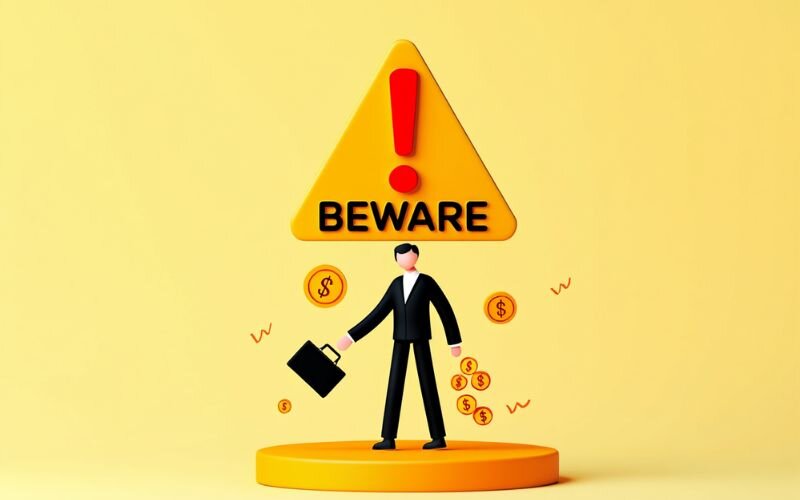
Here are common red flags to watch out for when evaluating how to find a broker for forex:
-
Guarantees of unrealistically high profits or "no-risk" trading:
Forex trading inherently involves substantial risk. Any broker promising guaranteed high returns (e.g., "Double your money in a month!", "Risk-free profits!") is almost certainly a scam. Legitimate brokers will always provide clear risk warnings.
Example: An ad claiming "Our system guarantees 30% profit every week with zero losses."
-
Lack of clear regulatory information or unverifiable regulation:
If a broker is vague about their regulatory status, doesn't display license numbers, or claims regulation by an unknown or very weak offshore authority, this is a major warning. As emphasized, for US traders, lack of NFA membership and CFTC registration for retail forex is a deal-breaker.
Example: A broker only mentions being "incorporated" in an island nation known for lax financial oversight, with no mention of major regulatory bodies.
-
Aggressive sales tactics and pressure to deposit funds quickly:
Reputable brokers provide information and allow you to make an informed decision at your own pace. Scammers often use high-pressure tactics to get you to deposit money before you've had time to do proper research.
Example: Constant calls from a "senior account manager" urging you to deposit a large sum immediately to "catch a once-in-a-lifetime market opportunity."
-
Poorly designed or unprofessional website:
While not definitive on its own, a website riddled with spelling errors, broken links, generic stock photos, and a lack of detailed information can indicate a less-than-professional or even fraudulent operation.
Example: The "About Us" page is vague, uses stock images for its "team," and the contact information is just a generic email address.
-
Difficulty or excessive delays in withdrawing funds:
This is one of the most common complaints about scam brokers. They might make it easy to deposit but create numerous obstacles, excuses, or exorbitant fees when you try to withdraw your money.
Example: Your withdrawal request is ignored for weeks, or suddenly new, undocumented "taxes" or "fees" are required before funds can be released.
-
Consistent negative reviews about fund safety or withdrawal issues:
While individual negative reviews should be taken with a grain of salt, a pattern of credible complaints across multiple independent sources regarding inability to withdraw funds or unexplained account discrepancies is a serious alarm.
-
Bonus offers that seem too generous or have overly complex/restrictive terms:
Large deposit bonuses can be enticing, but always read the fine print. Some scam brokers use bonuses to lock in your funds, requiring an impossibly high trading volume before any withdrawal (of bonus or profits, sometimes even your initial deposit) is permitted.
Example: A 200% deposit bonus that requires you to trade 1000 times your deposit + bonus amount before you can withdraw anything.
-
Lack of transparency in trading conditions:
If a broker is not clear about their spreads, commissions, swap fees, or other charges, it’s a bad sign. Hidden fees can quickly erode any potential profits.
Your best defense is due diligence. Thoroughly research any broker using the steps outlined in this guide, especially verifying their regulatory status with official bodies. Trust your instincts; if something feels off, it's better to err on the side of caution and look for a more transparent and reputable alternative. Understanding how to avoid forex broker scams is just as important as knowing how to pick a good one.
7. Special considerations for US forex traders
Trading forex in the United States comes with a unique regulatory landscape designed to protect retail traders. If you are a US resident, understanding these specific rules and how they impact your broker choice and trading activity is absolutely essential. Choosing a broker that isn't compliant with US regulations can expose you to unnecessary risks.
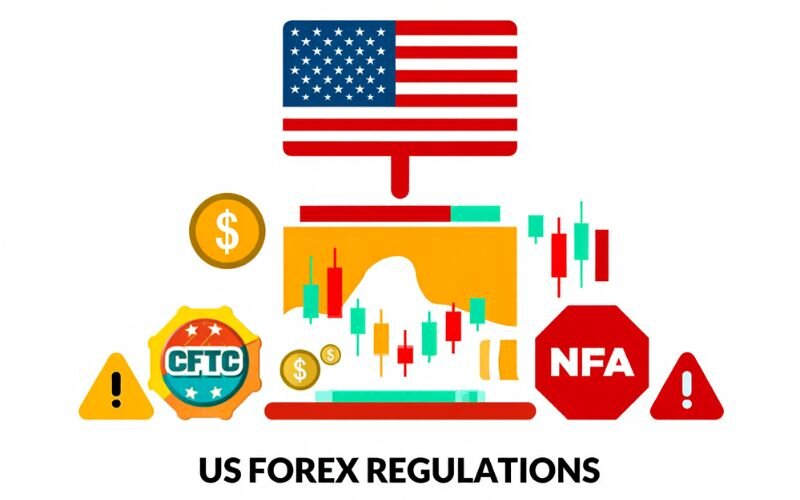
Here’s what every US forex trader needs to know:
- The paramount importance of NFA/CFTC regulation:
As stressed throughout this guide, US residents looking to trade forex must choose a broker that is registered with the Commodity Futures Trading Commission (CFTC) as a Retail Foreign Exchange Dealer (RFED) and is a Member of the National Futures Association (NFA). These regulatory bodies enforce strict rules on how brokers handle client funds (requiring segregation), maintain capital adequacy, ensure transparent pricing, and report trading activity.
- Examples of brokers known to be regulated for US clients:
While the list of brokers can change and it is absolutely crucial for every trader to conduct their own thorough due diligence and verify a broker's current regulatory status directly with the NFA's BASIC system (Broker-Dealer and Investment Adviser Information Center), some examples of brokers that have historically been regulated to offer Forex trading to US retail clients include:
-
- FOREX.com (GAIN Capital)
- IG US
- OANDA Corporation
- Charles Schwab Futures and Forex LLC (TD Ameritrade's forex accounts were moved here)
This list is for illustrative purposes only, is not exhaustive, and does not constitute an endorsement or recommendation by H2T Finance. Brokerage services, offerings, and regulatory status can change. Always verify a broker's credentials and suitability for your needs before opening an account or depositing funds.
- Personal experience shared by many seasoned US traders:
Dealing with an NFA/CFTC-regulated broker provides a significant layer of security and recourse that simply isn't available with offshore, unregulated entities. While an offshore broker might tempt you with higher leverage or certain trading practices not allowed in the US, the risk of losing your funds or facing unfair treatment is substantially higher. The peace of mind and investor protections offered by US regulation are invaluable. Don't compromise on this.
- Leverage restrictions:
To protect retail traders from excessive risk, the CFTC imposes strict limits on leverage for forex trading. Typically, this is:
-
- 50:1 for major currency pairs (e.g., EUR/USD, GBP/USD, USD/JPY)
- 20:1 for minor currency pairs and exotic pairs
Any broker offering higher leverage to US retail clients for forex trading is likely not compliant with US regulations or is not authorized to solicit US persons. Be extremely wary of such offers.
- FIFO (First-In, First-Out) rule:
NFA Compliance Rule 2-43(b) mandates the FIFO rule. This means that if you have multiple open positions on the same currency pair, you must close the oldest position first when offsetting part of your total position. This rule impacts how some trading strategies can be implemented, particularly those involving scaling in and out of positions in a non-sequential order.
Example: If you buy 1 lot of EUR/USD, then later buy another 1 lot of EUR/USD, and then decide to sell 1 lot, the first trade you opened will be the one that is closed.
- No hedging rule:
The same NFA rule also effectively prohibits hedging for retail clients in the same account. This means you cannot simultaneously hold a long (buy) and a short (sell) position on the same currency pair in the same trading account. If you want to take an opposing position, you must first close out your existing position or reduce it.
From experience: While some traders coming from other jurisdictions find FIFO and no-hedging restrictive initially, many adapt their strategies or find that these rules encourage more disciplined trading by forcing a clearer directional bias.
- Tax reporting requirements:
Profits from forex trading are generally taxable income in the US. Brokers catering to US clients will typically issue a Form 1099-B (or equivalent) at year-end, which details your trading gains and losses.
It's crucial to understand your tax obligations. Forex gains can be subject to different tax treatments (e.g., Section 988 for spot forex or Section 1256 for certain forex futures/options, though most retail spot forex falls under 988).
- Broker solvency and protection:
While NFA/CFTC regulation provides strong oversight, it's important to note that, unlike stock brokerage accounts covered by SIPC insurance, there is currently no equivalent government-backed insurance program like SIPC for retail spot forex accounts in the US in the event of a broker's insolvency. This further underscores the importance of choosing a well-capitalized, reputable, and NFA/CFTC-regulated broker.
Navigating the US forex market successfully means embracing its regulatory framework. While some rules might seem different from other regions, they are ultimately in place to protect you, the retail trader. Prioritizing a compliant broker is the cornerstone of a secure trading experience in the United States.
8. FAQ about ways to find a broker for forex
Here are answers to some common questions traders have when learning how to find a broker for forex:
Q1: How do I know if a Forex broker is legitimate and not a scam?
The most crucial step is to verify their regulatory status with reputable financial authorities. For US residents, this means checking if they are an NFA Member and CFTC registered via the NFA's BASIC system. Look for their license number on the regulator's official website. Also, seek transparent fee structures, realistic profit claims (beware of guarantees), and a history of positive (but objective) user reviews regarding fund safety and withdrawals.
Q2: What is the minimum deposit to start Forex trading?
This varies greatly among brokers. Some offer "Micro" or "Cent" accounts with minimum deposits as low as $10 - $100, ideal for beginners. Standard accounts might require $200 - $1000 or more, while ECN accounts often have higher minimums. Choose based on your risk tolerance, trading plan, and what you can afford to lose.
Q3: Can I trade with a broker not regulated in the US (e.g., only CySEC licensed) if I am a US citizen?
Legally, brokers wishing to offer forex trading services to US citizens must be registered with the CFTC and be NFA Members. Trading with an offshore broker not holding these US licenses carries significant risks for US residents, including lack of investor protection under US law, potential difficulties with fund recovery, and possible non-compliance with US tax reporting. H2T Finance strongly advises US residents to prioritize NFA/CFTC regulated brokers.
Q4: What's the main difference between a Market Maker and an ECN broker? Which is better for a beginner?
Market Maker (MM) brokers (often dealing desk brokers) typically create the market for their clients, meaning they may take the other side of client trades. They often offer fixed spreads and may not charge commissions. ECN (Electronic Communication Network) brokers pass client orders directly to an interbank network of liquidity providers, offering variable (often tighter) spreads but usually charging a commission per trade.
For beginners, a reputable Market Maker can be simpler to start with due to more straightforward fee structures, often lower minimum deposits, and potentially more user-friendly platforms. However, as traders gain experience, many gravitate towards ECN brokers for potentially better pricing and execution transparency. The key is choosing a reputable broker, regardless of type.
Q5: Which trading platform is best: MT4 or MT5?
Both MetaTrader 4 (MT4) and MetaTrader 5 (MT5) are excellent and widely used.
- MT4 is older, very popular for forex, with a vast library of custom indicators and Expert Advisors (EAs). It's often sufficient for most forex traders, especially beginners.
- MT5 is newer, offers more timeframes, more built-in indicators, an integrated economic calendar, and can support trading in other markets (stocks, futures) if the broker provides access.
Test both on a demo account to see which interface and feature set you prefer. Your choice might also depend on what your chosen broker offers and supports best.
Q6: Do I need a broker for forex?
Yes, to trade retail spot forex, you generally need a forex broker. Brokers provide the trading platform, access to market liquidity (the ability to buy and sell currencies), and handle the execution of your trades. Individuals cannot typically access the interbank forex market directly without substantial capital and infrastructure.
Q7: Is $100 enough to start forex?
While some brokers allow you to start with $100 or even less (e.g., with micro or cent accounts), it's important to have realistic expectations. With $100, you'll likely be trading very small position sizes (micro lots). While it's possible to learn and gain experience, significant profit potential with such a small capital base is limited, and the risk of losing the entire amount is high. It's more a way to learn the ropes than to make substantial income. Always trade with capital you can afford to lose.
9. Conclusion
Finding the best forex broker for your individual needs requires careful research and due diligence, but it's a foundational step for a sustainable trading journey. By following this comprehensive how to find a broker for forex guide, meticulously verifying regulatory credentials, evaluating key cost and platform factors, and remaining vigilant against potential scams, you'll be far more confident in selecting a trustworthy partner for your forex endeavors.
The forex market is dynamic. Stay informed about market changes, regulatory updates (especially in the US), and continuously refine your understanding of what makes a broker suitable for your evolving trading style. Don't forget to follow the Forex Brokers category of H2T Finance for the latest insights, broker reviews (if applicable), and in-depth analyses of the Forex market. Your informed choice today can pave the way for a more secure and potentially successful trading future.
